Response to Pastor Steven Wedgeworth’s “What is Eastern Orthodoxy?” — Trinity Talk Interview No. 3 (30 November 2009)

Pastor Steven Wedgeworth
In this blog posting I will be responding to Pastor Wedgeworth’s November 30 Trinity Talk presentation. This review will be structured along the lines of topics than chronology. Given the large number of topics covered, I have grouped them into five broad categories: (1) why people are converting to Orthodoxy, (2) anti-Augustinianism, (3) Orthodoxy as civic religion, (4) unity with Rome, and (5) unity with Protestants. To facilitate the review I will be referencing his statements by minute and second in the podcast. At the end of the blog posting will be: (1) an assessment of Wedgeworth’s November 30 podcast, and (2) an assessment of the three talks as a whole.
I. Why are Reformed Christians Converting to Eastern Orthodoxy?
In recent years there have been a growing number of Evangelicals and Reformed Christians converting to Eastern Orthodoxy. Wedgeworth gave several reasons why people have become Orthodox.
Not Roman Catholicism (3:30)
According to Wedgeworth, some people see Eastern Orthodoxy as Roman Catholicism without the Pope. So if you’re interested in leaving Protestantism but you’ve been brought up to believe that the Catholic Church is evil and the Pope is the Antichrist, then Orthodoxy becomes an alternative. (4:04)
My Response — What strikes me here is how Wedgeworth framed his answer with a negative bias: If you are anti-Protestant and you are anti-Catholic, then you are going to be pro-Orthodox. I suspect that in most instances, people who became Orthodox did so for overwhelmingly positive reasons. In all fairness to Protestant converts, most are serious Christians who are sincerely looking for the historic ancient church. Those who are looking for the historic church prior to the 1500s are faced with two choices: Roman Catholicism and Eastern Orthodoxy.
But before asking where they looked, Pastor Wedgeworth might have asked why? Why are they looking? Many are looking because of the continuing weakness and fragmentation of Protestantism. Others are looking because their own Protestant leaders have over the past several decades moved away from the Evangelical or Reformed status-quo, and moved towards to a more Liturgical and Sacramental Church. New converts are often merely following the lead of their leaders — but following through with a more full and complete solution in Orthodoxy. They want something more than a mere tweaking or reshuffling of old Protestant and Roman Catholic categories and practices — they want the historic Church.
Pastor Wedgeworth would also have done well to ask who? Who are the converts to Orthodoxy? What is astounding about the converts into the Orthodox Church is their variety! We find pastors, seminary students, lay leaders, and devoted long time Christians. These are people who are deeply familiar with the beliefs and practices of their churches and have enjoyed years of warm fellowship there. Converts come from all kinds of backgrounds: Evangelical, Charismatic, Anglican, and Roman Catholic. Increasingly, converts to Orthodoxy include those from non-Christian background. I highly recommend Kevin Allen’s podcast series Illumined Heart for stories about people coming to Orthodoxy.
Very Aesthetic (4:50)
Orthodoxy has a very aesthetic aspect to it. Their worship is typically very beautiful — lots of chanting and singing, lots of gold. The icon is very pretty. (4:50)
My Response — The aesthetic elements of Orthodox worship are really New Testament or “Incarnational/Resurrection Upgrades” of Old Testament Tabernacle worship which were commanded in the Pentateuch. Moses was ordered by God himself to organize the worship “according to the pattern” shown on Mt. Sinai. See the section “According to the Pattern” in an earlier blog posting. In addition, Evangelicals and Reformed Christians need to take seriously the biblical passages on the “beauty of the Lord” (Psalm 27:4, Psalm 90:17), and worshiping the Lord in the beauty of holiness (I Chronicles 16:29; Psalm 110:3).
Beyond the aesthetic elements is the centrality of the Eucharist to Orthodox worship. Many Protestants are drawn to Orthodox worship because of the centrality of the Eucharist and Orthodoxy’s firm belief that we truly receive the body and blood of Christ in the Eucharist. The focus on the Eucharist in the Sunday worship opens up the possibility of the Christian life as a profound union with the Trinity: Father, Son, and Holy Spirit.
It’s Different (5:05)
It feels so foreign. It’s more authentic. There’s a higher level of commitment, a stronger level of commitment. It’s a very foreign looking church. So to go to that church you’ve got to be weird. (5:27)
There’s something about weirdness that makes you feel you’re doing the right thing. It’s a badge of honor. We see that in the Reformed church; the stricter and tougher you are, the less like everyone else you are, the better (6:14)
Conversion Sickness
With respect to “weirdness,” Pastor Wedgeworth concedes that the Reformed also value what he calls “weirdness.” And is it “conversion sickness” if someone embraces the Reformed faith? I doubt Pastor Wedgeworth would warm to this label if it is applied to him and his friends. What he calls “weird” in Orthodoxy, most Orthodox Christians would merely call “historic.” Think of a callow American teenager who hangs out at the mall and on upon visiting a home of one of the royals in England and declares: “Weird!”
It is not helpful for Pastor Wedgeworth to label conversions to Orthodoxy as “conversion sickness.” (2:52) Apparently, this is a reference to an emotional need to be different or weird. He may have said this tongue in cheek but the frivolous tone diminishes the importance of this life changing decision and the high price some converts have had to pay. Furthermore, I believe that this sound bite answer has muddied the waters between Orthodoxy and Reformed Christians. It can lead to Protestants attributing emotional reasons for why so-and-so decided to become Orthodox, rather than engaging in a reasoned dialogue about worship, doctrine, and life in Christ. This is a subtle form of ad hominem attack, i.e., questioning the emotional stability of converts.
Two Converts: Peter Gillquist and Frank Schaeffer
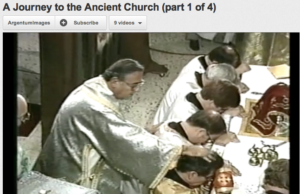
Metropolitan Philip welcoming the Evangelicals in 1987 Link
Pastor Wedgeworth discussed two well known Protestant converts to Orthodoxy: Peter Gillquist and his friends from Campus Crusade for Christ, and Frank Schaeffer, the son of Francis Schaeffer. When I listened to the interview I was bewildered to hear Peter Gillquist’s and his friends described as identifying with New Age mysticism. (9:44) In an email Pastor Wedgeworth admits that he confused Gillquist’s group with the Holy Order of MANS, another group that was received into the Orthodox Church. The fact that Wedgeworth confused two very different groups highlights his unfamiliarity with Orthodoxy. I do appreciate his willingness to correct this error in private, but I believe that he and Trinity Talk are morally obligated to include a brief correction paragraph on the webpage listing his interviews so as not to bear false witness against Fr. Gillquist and his fellow Evangelicals.
[Note: On 3-April-2012, Pastor Wedgeworth wrote a comment in which he graciously conceded the error. See below in the comment section. It should be noted that several groups converted to Orthodoxy. Those formerly with Campus Crusade for Christ, including Peter Gillquist, were received by the Antiochian Orthodox Church. Those formerly with the Holy Order of MANS were received by the Orthodox Church of America. It is understandable that unless one is familiar with the details that confusion can arise. RA]
For those who listened to Wedgeworth’s talks, the best thing is to go directly to the sources — those who made the switch. Those interested in learning how a group of Campus Crusade top leadership ended up in the Orthodox Church should read Peter Gillquist’s Becoming Orthodox. Also, there is a four part podcast series: A Journey to the Ancient Church.
See also “From Becoming Orthodox to Being Orthodox” Again Interviews Father Peter Gillquist.
And, Father Peter Gillquist’s recent reflection on their journey to Orthodoxy shortly after the passing of his friend and colleague, Fr. Jack Sparks in 2010.
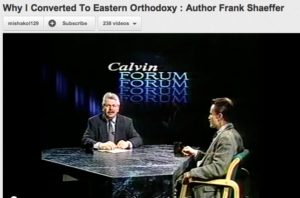
Frank Schaeffer at Calvin Forum
Wedgeworth describes Frank Schaeffer’s reason as: “Orthodoxy doesn’t preach at you; they don’t tell you how to live your life.” (10:24) Apparently he heard this on a television interview. It makes me wonder if Wedgeworth had read Frank Schaeffer’s Dancing Alone or watched his videotaped testimonies. At a Calvin Forum interview Frank Schaeffer talks about his “Jurassic Park” experience with Orthodoxy in California.
See also Frank Schaeffer’s “Is the Ancient Church Out of Date?”
My Response — What I find so striking about Pastor Wedgeworth’s answer were the reasons he did not mention. One reason why so many people convert to Orthodoxy is their attraction to the early church. This interest in the early church is often a reaction to theological liberalism in mainline denominations, or to the excesses of contemporary worship in Evangelical and Charismatic churches. Another appeal is the profound unity of the early church that stands in stark contrast to the bewildering denominational diversity of Protestantism. And then there is Orthodoxy’s Tradition. This two thousand years old Tradition dates back to the original Apostles. This Tradition gives Orthodoxy a tremendous doctrinal stability which is sadly lacking in Protestantism. Many have made the decision to convert to Orthodoxy after studying church history and historical theology.
One does not just get up and “become Orthodox” by walking down the aisle, or make a “decision” prayer to become Orthodox. Orthodox priests are trained to be cautious, and are quick to slow zealous converts down. The process is a slow one, sometimes taking several years. Those who desire to become Orthodox must become catechumens and faithful attendees of the Divine Liturgy and other services for an extended period of time before they are received into the Church — usually by chrismation and sometimes by baptism.
People who want to learn why people convert to Orthodoxy would do well to read or listen to Journey to Orthodoxy. These stories are valuable in that they provide empirical data about real peoples’ spiritual growth and how their theology changed. The variety of reasons why people are becoming Orthodox is fascinating and informative.
Recommended website: Journey to Orthodoxy.
Recommended YouTube video: Peter Gillquist “Why Protestant Clergy are Coming to the Orthodox Church.”
Recommended books: Peter Gillquist Becoming Orthodox; Frederica Mathewes-Green Facing East; Matthew Gallatin Thirsting for God in a Land of Shallow Wells.
II. Anti-Augustine
One surprise for me as I listened to Pastor Wedgeworth’s three talks was the attention he gave to anti-Augustinianism in Orthodoxy. Wedgeworth notes:
If you don’t like Augustine, if you feel Original Sin and predestination too harsh, you don’t have many respectable option. Most people in our circle won’t be interested in going to a mainline church.” (6:38)
Orthodoxy is the only Christian option if you don’t like Augustine. (7:22)
According to Wedgeworth, many of those who convert have been turned off by traditional Christian theology and in reaction will say: “That’s because it’s Western theology; the East can be my refuge in that regard.” (12:40) He devotes quite a bit of time to refuting the anti-Augustine attitude held by certain Orthodox Christians. He notes that at a recent theological conference the consensus was that the hostility to Augustine was a recent post-1940 phenomenon and that for some Orthodox Christians it served as a boundary marker making them different from the West. (21:37 to 24:50)
My Response — The first thing to note is the fact that Wedgeworth relied heavily on the academic authority of seminaries to make his point. Seminaries may play a major role in shaping theology in the West but that is not the case with Orthodoxy. Orthodoxy takes a more ecclesial approach to doctrine, e.g., the decisions by bishops, by church councils, the Ecumenical Councils, and the patristic consensus. The important fact here is that no Orthodox hierarch or church council has formally condemned Augustine of Hippo.
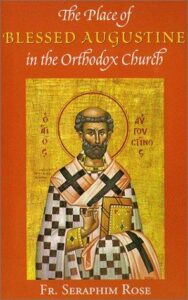
Book by Seraphim Rose
Orthodoxy’s disagreement is not so much with Augustine himself, but with Western Christianity’s excessive reliance on him for their theological systems. As with Anselm and Aquinas, Protestants take Augustine beyond where even he would be willing to go. When waves of barbarian tribes invaded the western half of the Roman Empire that part of the world entered into what is known as the Dark Ages. The decline in learning, commerce, and long distance communication resulted in isolation and insularity. In time the Latin West lost touch with the Greek Fathers and became increasingly reliant on Augustine to the exclusion of other Latin Fathers. Ironically, as the Catholic Church became almost exclusively Augustinian it began to lose its catholicity!
The eastern half of the Roman Empire did not experience a Dark Age like the West. The capital city of Constantinople continued to thrive as a political capital, a center of learning, and as a spiritual center. Because learning was still alive and well in the Byzantine Empire many of the clergy and laity were able to read the New Testament in the original Greek as well as the Greek Fathers. It is a well known fact that Augustine himself never mastered Greek!
I did not join the Orthodox Church out of animosity to Augustine or a fundamental disagreement with his theology. I did come across anti-Augustine rhetoric from time to time in my reading, but I never gave them much weight. My problem is more with the followers of Augustine who turned his teachings into fundamental dogmas of the Faith. I believe that Wedgeworth is making a mountain out a molehill.
III. Orthodoxy as an Ethnic or Civic Religion (17:56)
One thing that strikes me as I listened to all three interviews is Wedgeworth’s institutional understanding of the Orthodox Church. This carries over to his presenting Orthodoxy as a civic religion. He does not give any room to the Orthodox Church as a community of faith where genuine Christian spirituality can and do flourish. This, however, is a common reality throughout the world, especially in recent years with the fall of the Soviet Union, where many zealous converts are entering Orthodoxy there, as well as here in the US and other countries.
His anecdote about the Serbian family who abandoned their Orthodox roots and joined the Episcopal church in order to assimilate over simplifies a complex situation. Many immigrant families tenaciously held to their Orthodox roots, while others abandoned theirs in the attempt to become American. (19:06) Oftentimes ethnic Orthodox churches functioned more as ethnic clubs than faith communities. This also happens in the Protestant and Roman Catholic churches as well. There are also stories of faithful cradle Orthodox Christians who have a deep commitment to Jesus Christ.
While nominalism is certainly to be avoided, ethnic Orthodoxy is not necessarily a bad thing. It can be viewed as fulfillment of the Great Commandment in which the Apostles were sent out to “disciple the nations.” Note that Christ did not command them to disciple individuals but ethnic groups. In ethnic Orthodoxy we find the convergence of the cultural mandate in Genesis with the missionary mandate of the Gospels. The Orthodox missions tradition is based on the Incarnation. Salvation in Christ does not entail the abandonment of our culture but rather its fulfillment. To insist on a local parish that transcends earthly culture is to risk falling into a form of Gnosticism. Thus, the Gospels and church life must take root in the host culture. The Orthodox Church honors Saints Kyril and Methodios, two missionaries who translated the Liturgy and Scripture into the Slavic language. I recently came across a quote attributed to them:
To conduct the Divine Services in a language not known by the people is like writing in sand; it could not bear any spiritual fruit.
I can respect those who wish to have their Orthodox parish maintain their cultural heritage but I also see the need for Orthodox parishes with all English services and rooted in American culture. We can thank the ethnic parishes for bringing Orthodoxy to America, now it is time to bring Orthodoxy to Americans — in a language they understand and in a culture they can relate to.
IV. Unity Possible Between Orthodoxy and Roman Catholicism? (24:55)
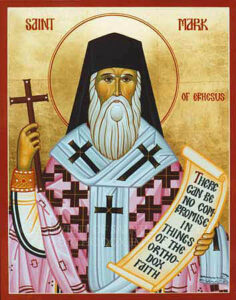
St. Mark of Ephesus
Pastor Wedgeworth answered bluntly: “I don’t think it’s possible.” (24:57) He recalls reading an article in which the author states that the only difference between Orthodoxy and Roman Catholicism was the Papacy. He quips: “But that’s like asking Mrs. Lincoln: ‘Other than that, how was the play?'” Then in a more serious vein, he adds: “That’s huge!” He notes that any attempt to unify Roman Catholicism and Eastern Orthodoxy would be a replay of the Council of Florence. He points to Mark of Ephesus as an example of Orthodoxy’s opposition to union with Rome. His icon shows him holding a scroll with the words: “I condemn the heresies of the Latins.” Wedgeworth closes:
They found it mutually beneficial to be different from the mainstream Evangelicals; and they’re both equally bizarre to American eyes. They’re interested in recovering an Old World pre-modern church, but they can’t unite. (26:56)
My response — The approach Pastor Wedgeworth takes here is curiously untheological. What he fails to highlight is the issue of authority. For Orthodoxy the source of faith and practice is the Apostolic Tradition; for Roman Catholicism, it is the Pope. Behind that is the understanding of the structure of the church; Roman Catholicism assumes the understanding the church as a monarchy, Eastern Orthodoxy views the church as conciliar, the consensus of the church based on Tradition.
Pastor Wedgeworth’s claim that the two churches find it “mutually beneficial to be different” is problematic on several levels. One, it is insulting in its insinuation that the root cause of the differences is psychological, not theological conviction. Two, it doesn’t match social reality. As American society becomes increasingly postmodern and post-Christian, the Evangelicals and conservative Protestants are increasingly being perceived as bizarre and out of touch with the American mainstream. Three, while some Catholics are ultra-traditionalist, many more are seeking to adapt Catholic faith and practice to contemporary culture. Four, the late Pope John Paul II worked hard to repair relations between East and West. In sum, to say that the two traditions are apart because they find it “mutually beneficial” is misleading and insulting. Here Pastor Wedgeworth muddies the water and in so doing does a disservice to his listeners.
V. How Should Protestant Evangelicals Interact with the Orthodox Church? (27:44)
I found a lot to like in this section. Pastor Wedgeworth brings a positive attitude to Orthodox-Reformed interaction. He notes:
We should be able to work with the Orthodox in their best expression. (28:08)
He recounts how at the time of the Reformation the Reformers had high hopes that reform would also come to the Orthodox Church. The basic assumption was that since both sides opposed the Papacy, they would have much in common and that what differences they had would be minor. (28:26) He points to Cyril Lucaris, the one time Patriarch of Constantinople, who was open to Reformed ideas. (28:44 ff.) Wedgeworth points to Orthodox and Reformed Christians sharing the belief that the civil magistrate, not the Pope, should order a Christian social order. (29:41)
Then in a shift to a more sober tone, Wedgeworth observes that the Reformers underestimated how difficult it would be to bring the Protestant Reformation to the East. (30:05) He attributes Orthodoxy’s resistance to reform to their being “very fond of their ecclesiology, liking it just the way it is.” (30:14) He notes: “They don’t even recognize us as a church!” He concludes:
Until they come to a position for a need for reform, we will not be able to talk unity. We won’t be able to join in ecumenical activity. There’s not a whole lot we can do. (30:29)
In the face of the serious differences between Orthodox and Reformed traditions, Pastor Wedgeworth calls for a loving and positive attitude in the face of a long and difficult task.
The best we can do is respect them, affirm the possibility that they are Christians by faith in Jesus. (31:15)
The only way you can get anywhere with anyone is charity. You’ve got to be nice, assume the best of them and hope they will assume the best of you. (32:37)
My Response — I commend Pastor Wedgeworth for his positive and open attitude to ecumenical relations with Orthodoxy, and for his honest recognition of the major obstacles that stand between the two traditions. I was heartened to hear him throw cold water on cheap ecumenicism that breezily calls for Reformed churches to invite Orthodox Christians to their Communion table. Wedgeworth points out that any Orthodox Christians who does this would be excommunicated. (31:10) However, some have suggested Orthodox and non-Orthodox can work together for a united Christian witness that is pro-life in the broad sense of the word in an increasingly post-Christian society. This is worth looking into.
Talking Point — The Early Church Fathers (31:29)
Wedgeworth notes that the huge church fathers collection — Ante-Nicene, Nicene and Post-Nicene Fathers — was started by Philip Schaff and was a joint effort by Protestants. (31:40) He sees this as a point of commonality between Orthodoxy and the Reformed tradition. He boldly claims of the Reformed tradition: “We are the heirs of the church fathers, heirs of the early church.” (32:25) He then notes that the likely Orthodox response will be a skeptical: “Are you really?” (32:25)
My Response — With respect to Orthodox-Reformed dialogue, I would like echo what Pastor Wedgeworth said earlier: “We should be able to work with them in their best expression.”
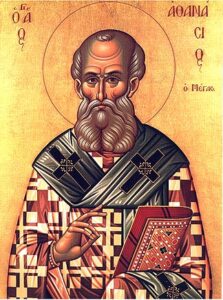
Athanasius the Great in bishop’s vestments
I like Pastor Wedgeworth’s suggestion that Protestants engage the early church fathers. The early church fathers series is a valuable resource for both Protestants and Orthodox. They also provide a point of commonality. The original Reformers made extensive use of the early church fathers. However, just taking a book off the shelf and reading it is not enough. One needs to be mindful of the way one reads the patristic texts. The vast majority of the church fathers held offices as bishops and were part of a unified Church. Thus, when Orthodox Christians read the church fathers they look for the patristic consensus. They also read the fathers within the context of the Ecumenical Councils. They avoid cherry picking passages that support their own individual agendas which is what Protestants often seem to do. Protestants need to be wary of imposing their Protestant or modern mental habits on these ancient Christian writings. In light of the fact that every one of these church fathers believed in (1) the episcopal authority of the bishop over the local church, (2) the real presence of Christ in the Eucharist, (3) apostolic succession, (4) the importance of honoring Mary as the Theotokos, and (5) the binding authority of the Ecumenical Councils one cannot assume them to be pre-Reformation Protestants; they weren’t!
For the Orthodox, “working with their best expression” means affirming Protestantism’s respect for Scripture by showing how the faith and practice of Orthodoxy are consistent with Scripture. I’ve tried to do this in my blog postings that show the biblical basis for icons and for Holy Tradition. I have also tried to show how the patristic consensus and the Ecumenical Councils provide a solid and useful framework for interpreting the Bible. I have tried to show that the Orthodox interpretation of Scripture is grounded in a historic tradition that goes back to the Apostles.
I would like add one more important area for Orthodox-Reformed dialogue — Christian worship. The dialogue can proceed along two issues: one where there is significant agreement and one where there is significant disagreement. The recent interest in the Eucharist and the real presence in the Eucharist in certain Reformed circles can provide common ground for discussion with Orthodox Christians. The recent Orthodox apologia for icons on biblical grounds need to be given serious attention by Reformed Christians. They cannot dismiss it out of hand in light of the fact that people who have studied at some of the best Reformed seminaries have found biblical grounds for the use of icons in worship. To uncritically refuse to take a look at the biblical evidence would be a betrayal of the original Reformers’ appeal to the authority of Scripture.
One area where I believe Orthodox Christians can learn from Protestants is the art of biblical exposition in the sermon. The Protestants’ love for Scripture is something that we should all emulate. This is not a call for long elaborate sermons that dominate the worship service or shows off the minister’s rhetorical flair. But Protestants can help the Orthodox with making clear, organized expositions of the Faith. Much can be done in a 15 to 20 minute homily that prepares our hearts and minds for the Eucharist.
CONCLUSION 1 — Interview No. 3
As I listened to Wedgeworth’s November 30 podcast I was impressed that he knew of the Council of Florence, St. Mark of Ephesus, Cyril Lucaris, and John Zizioulas. At the same time I am dismayed that he confused Peter Gillquist’s group of Evangelicals with the Holy Order of MANS. Much of this can be attributed to his being an outsider. It would have been good if the Trinity Talk interview was done with a knowledgeable Orthodox Christian, preferably a Protestant convert to Orthodoxy who is familiar with both traditions.
Wedgeworth’s tendency to psychologize conversions to Orthodoxy is demeaning. Using psychological explanations implies that the other side lacks a rational basis for their position. It would have been better for him to show the flawed reasoning behind peoples’ beliefs and practices.
Pastor Wedgeworth’s charitable and frank approach to Orthodox-Reformed dialogue is something I heartily agree with. It serves as a good role model for Orthodox-Reformed dialogue elsewhere. My hope is that this will not be the last word by Wedgeworth on Eastern Orthodoxy and that in the future we will hear him engaging in a face-to-face dialogue with a Reformed convert to Orthodoxy. That would be interesting!
CONCLUSION 2 — All Three Interviews
As noted in the first blog review, it is evident that Pastor Wedgeworth has done a fair amount of reading about Orthodoxy and has even taken the trouble to attend Orthodox services. I consider him one of the more informed and balanced Reformed commentators on Eastern Orthodoxy. However, a similar pattern of weaknesses also recur: oversimplification, unbalanced presentation of the issues, unfamiliarity with Orthodoxy’s finer points, and some egregious errors that calls for correction or public retraction. Much of this could have been avoided if a member of the Orthodox Church was invited to the Trinity Talk series. What the listeners learn about Orthodoxy here is filtered by Pastor Wedgeworth. A direct exchange between Pastor Wedgeworth and a committed Orthodox Christian would be more conducive to critical thinking and spiritual discernment. Wedgeworth’s Trinity Talk should not be viewed as the final word on the matter but a first step in understanding an important and complex issue. As growing numbers of Protestants convert to Orthodoxy it becomes increasingly pressing for Reformed Christians to investigate Eastern Orthodoxy.
Robert Arakaki
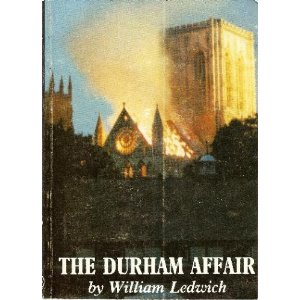 Ledwich’s The Durham Affair in which he cites a survey that found that over a third of the bishops in the Church of England denied the historicity of the Virgin Birth and nearly half denied the historicity of Jesus’ bodily resurrection. Initially, I wasn’t all that surprised by the findings of the survey having spent quite a bit of time with Episcopalians in Hawaii. But one Sunday morning as I went up to receive Communion I reflected on the fact that by receiving Communion at All Saints in Berkeley, I was in communion with the liberal Episcopalian bishop across the Bay in San Francisco, and furthermore I was in communion with the liberal Anglican bishops across the Pond in England who denied the basic tenets of the Creed! I stopped going there soon after. One way out of this conundrum is to adopt a Zwinglian “just a symbol” approach to the Eucharist but this would involve a decisive break from the historic understanding of the Eucharist. Leithart can import all sorts of Anglican aesthetics into his Sunday “Liturgy,” but where does he stand with respect to the real presence of Christ’s body and blood in the Eucharist? Without the real presence in the Eucharist one will end up beautifying a weekly ritual. In the article for First Things Leithart talks about the need for Evangelicals to recover the Eucharist, but I could not find any affirmation of the real presence.
Ledwich’s The Durham Affair in which he cites a survey that found that over a third of the bishops in the Church of England denied the historicity of the Virgin Birth and nearly half denied the historicity of Jesus’ bodily resurrection. Initially, I wasn’t all that surprised by the findings of the survey having spent quite a bit of time with Episcopalians in Hawaii. But one Sunday morning as I went up to receive Communion I reflected on the fact that by receiving Communion at All Saints in Berkeley, I was in communion with the liberal Episcopalian bishop across the Bay in San Francisco, and furthermore I was in communion with the liberal Anglican bishops across the Pond in England who denied the basic tenets of the Creed! I stopped going there soon after. One way out of this conundrum is to adopt a Zwinglian “just a symbol” approach to the Eucharist but this would involve a decisive break from the historic understanding of the Eucharist. Leithart can import all sorts of Anglican aesthetics into his Sunday “Liturgy,” but where does he stand with respect to the real presence of Christ’s body and blood in the Eucharist? Without the real presence in the Eucharist one will end up beautifying a weekly ritual. In the article for First Things Leithart talks about the need for Evangelicals to recover the Eucharist, but I could not find any affirmation of the real presence.


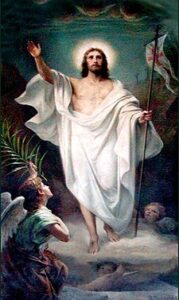
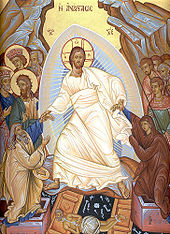






Recent Comments